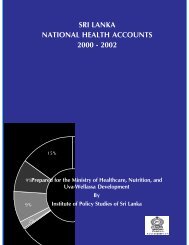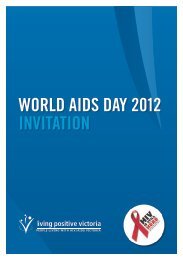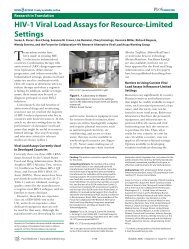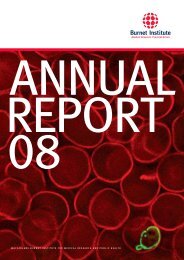Download - Burnet Institute
Download - Burnet Institute
Download - Burnet Institute
Create successful ePaper yourself
Turn your PDF publications into a flip-book with our unique Google optimized e-Paper software.
iCRLTAKING HIVTRAININGWHERE IT ISNEEDED MOST<strong>Burnet</strong>’s International Clinical ResearchLaboratory (iCRL) is focused on HIV laboratoryand clinician training, sharing knowledge andexpertise with local medical communities indeveloping countries.Created by Co-head of <strong>Burnet</strong>’sCentre for Virology ProfessorSuzanne Crowe AM, in answer toAustralia’s need for HIV testing,the Clinical Research Laboratorywas the first lab to bring HIV viralload and CD4 testing to Victoria.It measured the viral load ofall HIV patients at The Alfred(as well as from some otherhospitals and clinics in Victoria,NSW and Tasmania) from 1996to 2012 and is accredited bythe National Association ofTesting Authorities.In February this year, <strong>Burnet</strong>handed over HIV viral load testingto The Alfred hospital allowingthe CRL to focus on the growingdemand of strengtheninglaboratories in other countries inthe Asia and Pacific regions.Supervising scientist, AdeleLee-Wriede says the teamapproaches its work with ahumanitarian view, providingits expertise to help Australia’sneighbours improve theirown laboratories and take onaffordable tests for monitoringHIV infection.“So the iCRL was born – the ‘i’standing for international. We arein a prime position to collaborateand assist these countries in ourregion in developing their ownlaboratories and strengtheningtheir HIV monitoring,”Ms Lee-Wriede explained.LAB STRENGTHENINGThe iCRL has also beenappointed the World HealthOrganization (WHO) RegionalReference Laboratory for HIV DrugResistance testing in the Asia-Pacific region.In this role the iCRL developsnew, simpler tests to determinewhether HIV strains aresusceptible to anti-HIV drugsand performs surveillance in theregion as well as research intodrug resistance.Ms Lee-Wriede spent a weekat the University of Indonesia inearly 2012 training staff in HIVdrug resistance and performingan audit of their laboratory aspart of the laboratory’s work withthe WHO.“It was such a greatopportunity; I initiallydemonstrated the assay to thescientists explaining each ofthe steps and then I supervisedthem as they performed the test,auditing their procedures andfacility,” she said.While Professor Croweand her team have beenworking in these neighbouringcountries for more than adecade, the new iCRL structurewill allow them to accept moreopportunities to train techniciansand assess laboratories in thedeveloping world.Further work planned includestraining of scientists from thePhilippines in a low-cost HIVviral load assay and assistingscientists from Papua NewGuinea to develop further skillsin quality control and drugresistance testing.“In the scientificcommunity we arealways striving to dobetter by the patientsand trying to developthe best possible, andmost affordable, testwithout forgettingthat the major burdenof disease is indeveloping countries,”Ms Lee-Wriede said.“It’s impossible to transfersophisticated tests to countriesthat are lacking the basicrequirements – running water,constant electricity, fridges andfreezers for storing samples;even logistically getting a bloodsample from the patient in aremote clinic to the laboratory isextremely difficult.12 IMPACT Summer 2012









